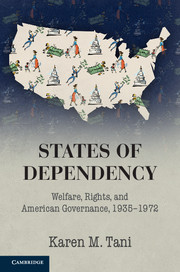PART I - 1935 TO 1949
Published online by Cambridge University Press: 05 April 2016
Summary
States of Dependency is divided into two parts that loosely track two different eras in public welfare law and administration. Part I covers the years between 1935 and 1949, when the general trends in American poor relief were toward uniformity, centralization, professionalization, and the establishment of legal rights. Throughout this period, there was great resistance to these trends. But with Democrats in control of Congress (until 1947) and the executive branch, and courts taking a fairly deferential posture toward agencies, federal administrators of the Social Security Act pursued their goals with relative confidence and freedom. (They faced a very different climate in the decades that followed, as Part II argues.)
Chapter 1 centers on the public assistance titles of the Social Security Act of 1935 and connects them with the larger regime of governance that scholars call the “modern American state.” Through conditions attached to grants-in-aid, New Deal reformers attempted to achieve a goal far beyond the existing capacity of the federal government: to reorder responsibility for, and power over, poor Americans around the nation. Desperate for resources, states eagerly accepted federal funds. Unfortunately for federal administrators, however, the long tradition of localized poor relief, combined with many states’ lack of administrative machinery, meant that little went as planned.
Starting in the late 1930s, Chapter 2 shows, federal administrators turned to the increasingly powerful language of rights to achieve their goals. Owing to the legal and customary bounds of federal power, they had no direct means of influencing local welfare workers and little faith in the efficacy of state supervision, so they reached out indirectly, through speeches at social work conferences, written guides for state field-workers, and allies in social work education. In all these communications they drew on rights language – which gained heft from the nation's confrontation with totalitarianism – to explain the foundation of the public assistance program and to criticize the poor-relief tradition that threatened to overwhelm it. Payments were “entitlements” not “gratuities”; the poor were “claimants” not “paupers.” Administrators ascribed to recipients ancillary rights, as well – to payment in cash rather than “in kind,” to a confidential relationship with their state and local welfare agencies, and to basic fairness in the consideration of their applications.
- Type
- Chapter
- Information
- States of DependencyWelfare, Rights, and American Governance, 1935–1972, pp. 23 - 26Publisher: Cambridge University PressPrint publication year: 2016



